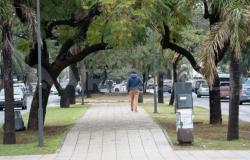“A carancho It is a person who gets cases on the street or in medical centers through intermediaries. A lawyer He gets the intermediary, a person whom he trains and, without becoming a lawyer, advises. It must be clarified that this advice is prohibited because the Ethics Law (all bar associations have their provincial ethics law) prohibits intermediation in taking cases on the street. Not so when the lawyer with a professional license approaches a person who is damaged or finds out through some means that the individual is hospitalized, and then agrees with that information to provide professional help or advice,” explained the lawyer, who received 25 years ago at the National University of La Plata.
Lawyer Guillermo Mercapidez (6).JPG
Maria Isabel Sanchez
Why does a lawyer become a jerk?
Mercapidez, who at the age of 9 came to Neuquén from Tres Arroyos – his hometown -, associated this activity with the first years of professional action of certain offices that “need to make money” and require having “issues” to “use themselves” of himself.
“When I started working as a lawyer, I was a jerk and went out to look for my topics. What does this mean? Fishing the frequency of a patrol car and seeing where the accident was and taking the matter on the spot, sleeping in hospitals – I was 23 years old at that stage -, and being on duty on Fridays and Saturdays at dawn when the greatest number of accidents generally occur. “, said the man from Neuquén.
“That’s not bad, there is no unfair competition because you go out and look for the job yourself. When you start in the professional activity of a lawyer you cannot stay behind a desk. To make the wheel you need to have cases. And once the round is done and you have the cases, those same clients for whom you finish the matter well send you others. And you become a desk lawyer,” explained Mercapidez, who considered that “caranchaje” is for a “small” structure.
“They are lawyers who have just started and when they are nourished by a large structure they begin to work by word of mouth. In Argentina there are specific people where these intermediaries are within an armed business. Currently in Neuquén, I take cases by word of mouth because I no longer go out on the streets. At the time, when I went out, I found that I was saturated with intermediaries who are not lawyers. The Neuquén Bar Association has played a fundamental role in preventing these issues. The current and previous drivers have been able to demand immediate registration for the personal attention of those people who were injured. It happened with the big studios, called ‘bolseros’, which were from Mendoza, San Luis or Buenos Aires and you never met the owner of the studio. So, you were being attended to by a 21-year-old person with ten law subjects. And that person was advising you on specific issues without having had the experience and knowledge. And that is punishable by law.”
The rates
In turn, he specified that the injuries are priced. “I understand that a broken tibia and fibula costs so much money. I also work in Capital (Buenos Aires) and for a file belonging to a young boy due to bankruptcy, you have to give the dater about 300 thousand pesos so that he can bring you the issue closed and the person can sign the documentation in your studio. For three or four like those, you have to have a petty cash amount of 3 or 4 million pesos to be able to cover those expenses,” said Mercapidez, who has several specialization courses in diseases and injuries, related to road and work accidents.
Depending on the severity of the injury suffered by the victim, a datero from Neuquén can charge approximately the following amounts: upper limb amputation $250 thousand pesos, broken tibia and fibula $150 thousand, chronic back injuries in the thoracolumbar sector $100,000, rotator cuff tear plus problems ligament injuries of both knees, $120,000, exposed breakage of long bones $250,000 in people under 30 years of age.
Meanwhile, the Neuquén by adoption indicated that he opts for direct intermediation with the client and following up on ART notifications so that he does not renounce any type of right. “In large studios they do not have the warmth of being attended to by the owner, who is ultimately the one who bears the professional responsibility,” he said.
The lawyer described why the immediate intervention of the lawyer with the injured party is important and assured that oil employees are very “mistreated.” “Insurers in Neuquén and Río Negro, where there are many spinal diseases due to lifting at the mouth of oil wells, in the personnel who dismantle and assemble equipment, the ART do not control the health conditions of these people. And after three years as dictated by decree 492014, a 27 or 28 year old person with four years of experience in the well has his back destroyed. And that is one of the issues that we are working on a lot.”
The help of the carancho lawyer
In one of the trauma centers located on Fotheringham Street, in the morning and afternoon, a group of “caranchos” can be detected, which are usually meters from the entrances.
“These people advise the victim better than they can do inside. Many of the doctors who work for ART are functional to the interests of insurance companies, they reduce business risk. So, that guy who is out there providing advice to the person who is injured, perhaps he is opening his eyes to those doctors who work for a medical provider that is contracted entirely for ART. That is, they are direct employees. This means that the highest income for this type of centers, I estimate, is for ART because it serves almost exclusively for them,” Guillermo explained.
“It’s perverse. It’s a system of ‘I’ll keep you warm here, I’ll run my hand over your back, it’s going to go away, and you’re already in trouble when the hernia is inoperable. And when the hernia is inguinal, we must request the unconstitutionality of the legislation that prohibits you from being able to claim that type of hernia. Because the efforts with the abdomen are also made a lot in the (oil) wells and the ART does not cover them.”
In this area, the risks are latent and “tightening” or situations of great tension can happen. Mercapidez assured that during his time as a “carancho” he received anonymous threats. He experienced that episode working in Buenos Aires for getting into areas that did not belong to him.
“It was for going to look for a case in Lugano, Villa del Parque and Lanús. Since I had a Provincial license, I was getting into places that were not mine. I received threats and pressures. For a long time I had to carry a weapon and I had custody. In major accidents where there are amputations or large losses, the interest in taking up the topic is very great. It is a profession where the lawyer who works in accidentology takes great care of himself. It’s like in the film ‘The Devil’s Advocate’ Keanu Reeves (protagonist) wins an audience and Al Pacino (other of the figures) tells him ‘Don’t let him come to you boy, change that southern casanova face’. I had the face of a southern casanova, I dressed in Hugo Boos, I had the convertible when I was 26 and I gave it up because the degree of exposure makes people scared. I learned over the years that the best way is to have direct contact with people and make them feel that you were also a worker and suffered an accident. I graduated as a lawyer having been a waiter and working on construction sites. No matter how much they offer me, I would never be a lawyer for an ART. My motto in this society is to be a lawyer for the people to defend their rights,” he said.
His return to Neuquén
“When I returned to Neuquén in 2005, I went through ugly situations with people in power, from companies, such as having someone chase me, knowing personal data, receiving messages on my wife’s cell phone. Thank God, since I am 35 years old I am calmer, I handle a large volume of work,” said Mercapidez, who has a law firm in Buenos Aires, which is dedicated to criminal law and Accidentology.
Lawyer Guillermo Mercapidez (4).JPG
Maria Isabel Sanchez
The figure of the carancho is frowned upon in society since it seems that this intermediary takes advantage of people. However, for the lawyer it is a “wrong” assessment.
“Generally lawyers act with power of attorney. In large law firms, people empower a lawyer, give him a mandate and he acts before the Court. This mandate implies that the lawyer can be held accountable. The notary informs the people of this as well as the Justice of the Peace. Always the card that people have, which grants a mandate for you to bring the accident to them, is to ask for accountability. If people do not do so, the rights and laws are presumed to be known by everyone. I cannot go out and tell people that they have the obligation to ask me for accountability. By virtue of that, I do not know of cases in Neuquén where lawyers are made to transfer the economic rights of a trial. What does this imply; a crime that has occurred throughout and that is criminally sanctioned,” he explained.
And he admitted that there are issues where a family after signing with a caracho has been left empty-handed. Precisely, Mercapidez indicated that there are criminal complaints and that there have been cases where the lawyer’s registration has been removed because he has kept the people’s compensation. “This happens in very large cities where the character of the lawyer is very aspirational. Here in Neuquén they liquidate you on a professional level because it immediately comes to light when there is an irregularity. We are a small society where the lawyers and the judges know each other or you meet the lawyers who do criminal justice in the cafe.”
Characteristics of caranchos
If we have to talk about appearance and gestures, Mercapidez revealed that the carancho is a nice guy and that he is usually better dressed than the lawyer himself. These characters live day to day, he is a guy who is not registered and earns black money. They usually do not have many obligations and live a light life.
“In Neuquén there was an acquaintance with the last name Coria who was a legend. He looked like a lawyer, he drove a Jaguar and worked for large law firms and knew how to mediate very well with insurance companies. He was a guy who came to Neuquén from outside and has already passed away. Likewise, the profile has currently fallen a lot. The carancho used to be a guy in a suit who came to have coffee with the hospital directors. A trained guy, now there are many people who do not understand what he explains. “We live in a society with a lot of information but little knowledge,” he concluded.
Although the image and actions are controversial, the carancho advises everyone. There are no social scales, even though the majority of people who can come for their services are from the working class or vulnerable people with little education. The caranchos fly over all the time and eat what they have on hand. And again. Sometimes it can go well and other times it doesn’t in a kind of dark underworld, where the actors are many and connected.





